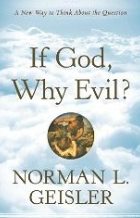If God, Why Evil? – a review
Those who have read many of Norman Geisler’s earlier works will likely recognize that this book is major update of an earlier book, The Roots of Evil (Grand Rapids: Zondervan, 1978). In this new version, Geisler sets out to offer, in his own words, a “short, simple, readable, and comprehensive book” on the problem of evil (p.9). Though I disagree with a few significant details of his treatment of this perennial topic, I believe that Geisler generally delivers on this goal.
The book is divided into ten chapters and three appendices, each dealing with a specific aspect of the problem of evil. Chapter 1 briefly outlines the various approaches to the problem of evil taken by followers of different worldviews.
Only theism acknowledges the existence of both God and evil, and thus only theism is confronted with the problem of trying to explain why evil exists in a world created by an allpowerful, all-good God. Chapter 2 addresses the question of the nature of evil, arguing that evil is not a thing or substance, but, following Augustine, it is a privation of goodness in things that ought to have goodness. As to the question of why such privations exist, the answer is not that God directly produces them but that he permits them for his sovereign purposes.
Chapters 3-8 are the heart of the book, dealing with such central questions as these: (1) How can a perfect being create imperfect creatures who do evil? (2) Why doesn’t God eradicate evil rather than letting it continue as he does? (3) Couldn’t God have made a better world that does not include evil? (4) Couldn’t God create free creatures who never sin? (5) Why doesn’t God miraculously intervene to prevent at least some instances of evil?
Throughout these chapters, among other things, Geisler returns repeatedly to two majors themes to address these and related questions. First, he appeals to the free will of creatures. So, for example, the origin of evil occurred when “a good creature (Lucifer) ... with the good power of free will ... willed the finite good of the creature (himself) ... over the infinite good of the Creator” (p.32). Also, regarding the question of why God cannot create free creatures who never sin, Geisler follows Plantinga in claiming that God “foresaw that every world of free creatures He could ever make would have some who would freely choose sin. So while such a world is conceivable, God knew it was unachievable” (pp.64-65). In explaining why God does not intervene to prevent more evils, Geisler claims, “If God stopped all free thoughts and actions by not allowing them to materialize, He would be negating the very freedom He granted in making this a free moral world” (pp. 87-88).
Second, Geisler exploits the Greater Good Theodicy. He contends that God allows the evil of pain to prevent one’s self-destruction and build character. Geisler also effectively argues that if God has to produce the best possible world, then a world with free creatures who can’t or don’t do evil may not be the best possible world. Rather, a possibly better world is one in which free creatures do evils that lead to greater goods (cf. p.65).
Chapters 9-10 and three appendices discuss several subsidiary matters such as the problem of hell, the problem of those who never hear the gospel, and the possibility of animal death before the Fall and how it relates to the problem of evil. In addition, Geisler summarizes some positive evidence for the existence of God and tellingly critiques William Young’s The Shack and its unorthodox approach to evil and suffering.
When Geisler appeals to the notion that God allows evil to bring about a greater good of some kind, I found his arguments to be plausible and often compelling. Those who hold to the existence of libertarian freedom will likely resonate with many of his arguments that appeal to such freedom in explaining evil. However, as a non-libertarian, I wish to challenge the adequacy of some of these appeals to libertarian freedom.
For example, when discussing the origin of evil, Geisler claims that God creates only perfect creatures but that perfect creatures endowed with free will can do evil. One wonders, though, how a creature who is capable of evil can really be perfect. It would seem that moral perfection requires the inability to sin. In fact, this claim is clearly incompatible with Geisler’s later assertion that those perfected in heaven will be incapable of sinning (p.62). Moreover, when Geisler explains the initial sin of Satan as him “will[ing] the finite good of the creature (himself) ... over the infinite good of the Creator,” he fails, contrary to his intention, to explain the origin of evil. For one can still ask the question, why did Satan will the good of the creature over that of the Creator? If Geisler answers that there was no reason, then it would seem that Satan’s choice was arbitrary and unmotivated – and thus one for which he hardly could be responsible. If he answers that Satan so chose because he wanted to, then Geisler has abandoned libertarian freedom as the explanation for the origin of evil.
Also, when addressing the question of why God cannot create free creatures who cannot sin, since God himself is free and incapable of sinning, Geisler insists that “freedom, as we have it here on earth, is incompatible with the impossibility to sin. Freedom in this context involves the ability to do otherwise” (p,61). As it stands, however, these are mere assertions. Geisler gives no argument as to why freedom on earth has to be of a different kind from God’s freedom (for more on why this is a serious problem for the libertarian, see my ‘Compatibilism and the Sinlessness of the Redeemed in Heaven’, Faith and Philosophy 28:4 [October 2011]).
Despite these flaws, If God, Why Evil? is a very good primer on the problem of evil. It will provide readers with a helpful introductory study of this age-old problem that they can then supplement with more advanced treatments.
 Author: If God, Why Evil? A New Way to Think about the Question
Author: If God, Why Evil? A New Way to Think about the Question
Book Title: Norman L. Geisler
Publication Details: Bloomington, MN:Bethany House, 2011, 167 pages, £9.99 / $14.99
Buy from Amazon.com.
Buy from Amazon.co.uk.
© 2011 The Gospel Coalition
This book review was first published in the online theological journal Themelios Volume 36.3, and is reproduced here courtesy of The Gospel Coalition, where further excellent theological resources can be found.



